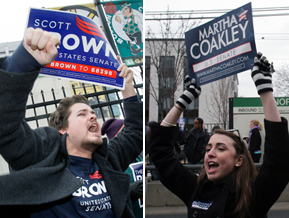The U.S. Supreme Court’s decision in Citizens United–holding that the government may not use campaign finance laws to silence the political speech of corporations–is the most significant First Amendment decision of the past decade. In holding that “the First Amendment confirms the freedom to think for ourselves,” the Court made it clear that the Constitution “entrust[s] the people to judge what is true and what is false.” Freedom of speech means that everyone, including corporations, has the right to participate in the “open marketplace of ideas” that is “an essential mechanism of democracy.”

But while Citizens United marks a major victory for First Amendment rights against expansive campaign finance regulation, the war rages on. Politicians worked to silence corporations because they have the resources to speak effectively. Politicians feared if this speech criticized them, it could threaten the one thing they care about most: re-election.
Suppressing speech for the sake of political self-preservation led Congress and many state legislatures not only to ban corporations from speaking, but to create a legion of laws to limit political speech and participation. These laws continue to prevent ordinary Americans from speaking out on important issues during elections, when most of our fellow citizens are paying attention.
SpeechNow.org, for instance, is a group of individuals who wants to protect the First Amendment; they plan to do this by pooling their resources and running ads against candidates who seek to suppress free speech through campaign finance laws.
Even though the Supreme Court has ruled that one individual may spend as much as she wishes to produce and broadcast her own independent political advertisements, whenever two or more people want to speak out about a candidate in this way, they must register as a “political committee.” That means that, unlike individuals, they must deal with complex administrative and reporting requirements that carry the threat of fines and even prison if not followed to the letter.
To add insult to injury, the law prevents anyone from contributing more than $5,000 to this kind of joint political effort. So, while George Soros may spend an unlimited amount to run political advertisements, a group of individuals may not. Between the law’s funding and administrative restrictions, most groups that want to speak simply cannot afford the time or the hassles to do so.
Campaign finance laws force Americans to choose between their First Amendment right to associate with others or their First Amendment right to speak out. Because Congress cannot force people to sacrifice one constitutional right in order to exercise another, SpeechNow.org has challenged these laws in court. SpeechNow.org will make its case for freedom of speech next Wednesday in a special session before the entire U.S. Court of Appeals for the D.C. Circuit. It could very well be that SpeechNow.org v. FEC is the next campaign finance blockbuster to go before the U.S. Supreme Court.
Another case illustrates how state campaign finance laws are used to intimidate political adversaries into silence. In 2006, Karen Sampson joined with several neighbors to fight against the annexation of their little community into the nearby town of Parker, Colo. They wrote letters, handed out signs and printed information sheets in an attempt to persuade their fellow citizens.
Little did they know that by banding together, they had unwittingly become an “issue committee” underColorado’s campaign finance laws. They soon found this out, however, when the pro-annexation forces filed a legal complaint claiming that Karen and the group had violated state law by not registering and complying with myriad reporting and disclosure regulations. The complaint threatened sanctions for the group’s “illegal activities” and ominously stated that anyone who had contacted the group or gotten a sign from them may be subjected to “investigation, scrutinization, and sanctions for Campaign Finance violations.”
Karen and her neighbors are fighting back in court–against both the burdensome campaign finance laws and the idea that your political opponents can use those laws to drag you into court in an effort to silence you. Karen is fighting laws that keep ordinary Americans mute while allowing only political insiders who can safely navigate the system to speak out.
So Citizens United, although momentous, is not the end. Those who favor campaign finance reform always promise that their utopia is only one more law away. But far from delivering any benefits, each of these laws after the next strangles the freedom of speech our nation was built upon. The struggle for everyone’s free political speech continues.
COMMENTS
Please let us know if you're having issues with commenting.